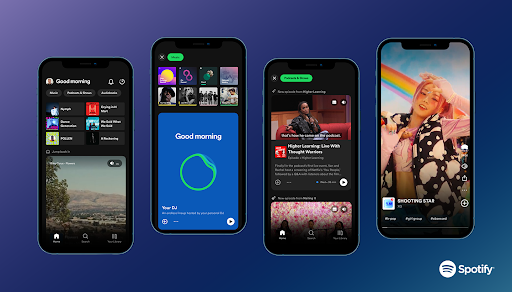
Imagine a world where your entire music library fits in your pocket, accessible with just a tap. This was once a distant dream, but since its launch in 2008, Spotify has turned that dream into reality and transformed the way we listen to music. What began as a small Swedish startup has grown into a global powerhouse. It contains millions of tracks and over 626 million monthly active users worldwide. Throughout the years, Spotify has become the most well-known music, audiobook, and podcast app worldwide, making the evolution of Spotify one-of-a-kind.
Spotify was founded by Daniel Ek and Martin Lorentzon, two people who envisioned a platform that could provide legal access to music while combating piracy. Intending to create a user-friendly experience, they developed a streaming service that allowed users to listen to millions of songs without downloading or paying to do so. The platform quickly gained popularity thanks to its vast library and easy-to-navigate interface.
Spotify’s introduction of streaming changed the music distribution landscape. Artists and labels could now reach more people without the limitations of physical sales, unlike CDs that have to be produced and sold in person. Spotify is a free model, which means it allows users to listen for free with ads every few songs, or users can pay for an ad-free experience with a membership. This membership is only $11.99, less expensive than YouTube Music or SoundCloud, which cost $16 and $16.99, respectively. This accessibility drew in a diverse user base, from casual listeners to die-hard music fans.
The standout feature of Spotify is its emphasis on personalization. Through advanced algorithms, the platform curates playlists tailored to individual tastes. Its Daily Mix and Discover Weekly are staples for users, introducing them to new music based on their listening habits. One of the most genius marketing strategies from personalization is at the end of every year, each user receives a unique Spotify Wrapped playlist, highlighting their top artists, songs, albums, and genres of the year. In turn, users share them on social media, which is free advertising for the company. Spotify Wrapped also has a statistic that tells you how much you have listened to your top artist compared to everyone else in the world, making it competitive as well as a bragging right that helps Spotify encourage more listening. This level of personalization not only enhances user engagement but also helps lesser-known artists gain exposure.
In recent years, Spotify has expanded beyond music to include podcasts, investing heavily in exclusive content that can only be listened to on Spotify. Acquiring popular shows and creating original programming has positioned Spotify as a leader in the podcasting space. It is already one of the most popular platforms for artists to upload their music, and this diversification has attracted new users and advertisers, further bolstering its position in the streaming services market.
Despite its success, Spotify has faced challenges. The platform has been criticized for its payment model, with many artists claiming that the per-stream payout is insufficient for the amount of listens their songs get. This has sparked debates about fair compensation in the streaming era. Spotify, on average, only pays about $0.003-$0.005 for every stream, making the payout extremely disparate to the work artist put into their music. Additionally, Spotify has had to navigate issues related to content moderation and copyright infringement like any other platform, needing to balance user freedom with legal responsibilities in every front of the industry.
As Spotify continues to evolve, it faces competition from other streaming services, like Apple Music and Amazon Music. However, its focus on personalization, exclusive content, and user experience will likely keep it at the forefront of the industry. Spotify has undeniably changed the way we consume music, making it more accessible and personalized than ever before. From its humble beginnings to its current status as a leading platform, Spotify’s journey reflects one that the business world will remember.
Works Cited:

